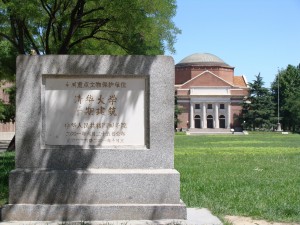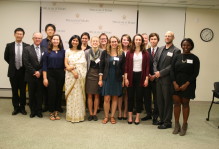Beijing Blog Part 9: The Program Begins
June 22, 2009-(Qinghua University [清华大学]-Beijing, China )
So my loyal readers, assuming I have any loyal readers that is, probably noticed the incredibly large time jump from my last post to this one, and that has been for a very good reason. The last couple weeks have been probably the most hectic I’ve witnessed in a long while.
After Part 8, we spent one more day in Shanghai, after which we took an afternoon plane ride back to Beijing, and checked into one of Tsinghua University’s numerous guest houses. The last week has basically been spent checking into the William and Mary summer program here, and getting acclimated to the constant Chinese that is being thrown my way for several hours at a time every day.
It’s been over a week now immersed in this intensive language-learning environment, and I’ve got to admit, after a couple

Qinghua University's old campus with the iconic rotunda in the background. Most of the teaching buildings here date back to when Qinghua was founded in 1911.
weeks, what was at first mindless droning when people were talking Chinese, at least to me, is slowly becoming to be bits and pieces of words here and words there.
I think if anything, the one thing that I’ve been proud of throughout this whole series that I’ve been writing ever since I got here is the fact that I’ve been trying to write about places and experiences that a usual tourist wouldn’t have, things that are kinds of “secret hotspots” around Beijing. Simply because, it’s my traveling philosophy, at least this time around, that I want to experience culture down at the local level, and to go and see places not on your average tour book or travel channel show.
This last weekend, another such event occurred.
Through a very long and windy road of connections, I’ve made very good friends with a fellow university student named Cynthia at the Beijing Institute of Technology in the Chaoyang District. Yesterday, she decided to take my roommate Jason and me to a local market to hone our rather rusty bargaining skills.
If I’ve learned anything after coming to China, it’s that you can bargain with just about anything. There are certain markets, namely department stores, that will not let you bargain at all, and some places, like restaurants, you’re expected not to bargain out of courtesy. However, all other places are fair game, and when it comes to the Chaoyang District’s famous Silk Market, well, bargaining is the name of the game.
Bargaining consists of a cat and mouse game of constantly trying to 1-up the seller of an item. The seller will traditionally start with a price. The buyer will traditionally say “too expensive”. And the process goes wherever you want to take it from there. Some people sometimes travel in packs and try to buy more of the same item, simply because it fetches a lower price. Others just simply try to bargain what they feel is how much the item is worth.
Many people often say that bargaining is like a game. I say it’s more like an art.
Unfortunately, more often than I dare to count, the seller often wins, simply because they’re more experienced and they can gauge a customer’s interest, probability of a sale, and how willing they are to buy, all in an instant.
This particular day was no different. After seeing Cynthia and her roommate Hillary bargain like pros and buy two Polo Ralph Lauren T-Shirts for 35 kuai ($4 US obviously fake) each, Jason and I decided to try our hand at buying some Burberry-ish looking scarves.
First thing we learned right off the bat was that since this is a market often frequented by foreigners, the prices get jacked up, a lot, especially on a weekend. The lady at first tried to charge us 375 kuai ($54 US) for one scarf.
Second thing we learned was that for people who are not used to bargaining on a regular basis, it’s very hard to figure out just exactly howmuch a “scarf” should sell for. Jason and I believed that 90 kuai was a good price for one scarf. Heck, 1/3 of any starting price was for many foreigners a dream. But that’s when Cynthia and Hillary interjected.
And we finally learned the third lesson of bargaining that day. Always take a local with you as both a guide and a mentor. With just Jason and I and our meager Chinese, the lady almost immediately realized that we were not Chinese, or at least, if she thought we were Chinese, definitely not from Beijing. Thus, she would not go lower than 100 kuai, and acted as if 90 kuai was just way too much for her.
But after a firm exchange of arguments and bargaining, within seconds, and I mean seconds, Cynthia and Hillary had the price down to 75 kuai. And just as I was about to pay my share of the 75 kuai, that’s when I noticed it. Cynthia and Hillary had bargained for the scarf and gotten it down the 75 kuai for two.
I think it’s safe to say that Jason and I still have a lot to learn about this art. Maybe by the time we master Taichi, we’ll master this. Hopefully…
Perhaps even more interesting than the bargaining market and more to do with the theme of my whole blog series, was the dinner that we had after the whole ordeal.
Cynthia and Hillary decided to take us to Ghost Street. A street widely known around Beijing for its neon-clad, lantern-lit restaurants which are open later than I’ve ever cared to stay up.
The destination was a rather peculiar, restaurant however. Among the Chinese blogs and websites, this particular establishment had been rated especially high for its chicken-wings, a Beijing delicacy. Yet, among the large, tablecloth-ridden eateries that lined the street, for some reason our destination and address took us to the darkest alley I’d ever seen.
If that wasn’t sketchy enough, a few meters down the alley and we suddenly ended up in the “restaurant’s” kitchen, which happened to be the courtyard of somebody’s hutong home. Needless to say, it surprised the heck out of all of us, who were expecting a nice establishment, not someone’s home.
But Beijing has a way of doing this to you. Where when looks may deceive, underneath, is a treasure trove of goodies. In this particular case, the food was spectacular. For a little over 130 RMB ($21 US) for the four of us, we stuffed ourselves silly with all kinds of wings both hot, spicy, and sweet.
When you’re traveling abroad and taking in new things, the saying “don’t judge a book by its cover” seems to be more important than anything anyone has ever imagined. And for good reason too. Perhaps my goal of not being a tourist this time around is well within my abilities to achieve, it just takes a little searching down the nooks and crannies of this great city.




No comments.
Comments are currently closed. Comments are closed on all posts older than one year, and for those in our archive.